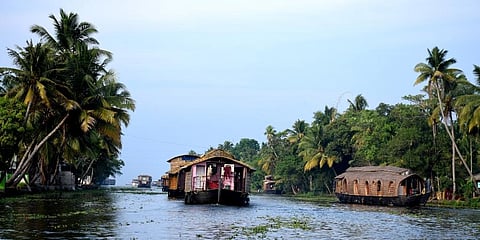

One of the images that comes to mind when you think of Kerala, widely called as the “God's Own Country” is its beautiful backwaters and a nice houseboat trip around it in the evening sun.
However, many of the boatmen who ply these boats are under so much stress that they fear they may have to stop their trade altogether.
The houseboat industry, centred in the Alappuzha district of Kerala, generates a large chunk of the state’s tourism revenue. However, a variety of issues now threaten the very existence of the industry, according to industry associations.
So aggravated are the operators of these houseboats that they have held a protest in front of the Alappuzha Collectorate today.
Waste Disposal Crisis
The immediate trigger for the protest is the paucity of ways to dispose of the human waste generated by the houseboats.
The houseboats need to empty their septage and other sewage every three months at a sewage treatment facility to obtain a renewed license.
This used to be handed over to the sewage treatment plant run by the District Tourism Promotion Council (DTPC). However, for the last one-and-a-half years, even the last remaining sewage treatment has been shut, forcing the boat operators to rely on private parties.
Not only is this costly – costing Rs 8,500 against Rs 3,500 earlier – but relying on private waste disposal methods, such as tankers, also lands the operators in trouble with the state pollution control board.
The Kerala State Pollution Control Board (KSPCB) has been imposing huge penalties on the houseboat operators in Alappuzha for wrong disposal of the sewage.
The houseboat owners say they are routinely slapped with penalties amounting to Rs 70,000, which – along with other legal encumbrances – makes it difficult for them to continue.
“Like how the coir industry has disappeared from Kerala, the houseboat industry is one step away from extermination,” said Kevin Rozario, general secretary of All Kerala Houseboat Owners and Operators’ Samiti.
“The government has failed to provide us with the necessary incentives and is sidelining us even though we contribute substantially to the state’s tourism revenue.”
Rosario accuses the authorities of being deaf to the cries of the industry, highlighting the ‘sewage crisis’ as a case in point.
“The government is asking us to pay a penalty without providing us with a solution to the problem,” says Rozario, referring to the actions of the KPCB.
He points out that with the last sewage treatment plant shuttering one-and-a-half years ago, there are no more sewage plants where houseboats can deposit their waste. Earlier, there used to be two sewage treatment plants in Alappuzha, one in H-block and another in Vattakayal.
“Currently, the only functional plant is at Kumarakom which refuses to take in the sewage from other areas,“ he complains.
In fact, so aggravated is he that he says the association is willing to run the plant if the government cannot.
“We can cover the expenses,” he says, adding that many of the boats are getting entangled in red tape due to the issue of sewage evacuation.
“We are unable to get a no-pollution certificate because of the lack of sewage treatment plants, even when all other papers are proper.”
Ever-changing regulations
Another issue raised by the protesting houseboat operators is that of unrealistic and ever-changing regulations.
Rozario alleges that the government – whether the one at the central or at the state level – are piling on impractical requirements and regulations without considering ground realities.
One of the examples he cited in this regard is the qualifications required for houseboat employees.
Under new rules, he points out, employees need to have studied up to class 12.
Kevin says this is not in sync with reality, as most of the workers generally employed by the houseboat owners are from the farming communities of Kuttanad. Only these people, he says, possess the knowledge of the backwaters and tides, and the physical strength, required to operate these boats. “We cannot employ people who are qualified in hotel management at houseboats. That is not how it works. We need people who know the waters and are familiar with its different characteristics. Who knows the water better than the farmers and fishermen in Kuttanad? But they are all unqualified as per the new criteria,” he laments.
The association is demanding that such impractical rules be rolled back and that the roughly 1.5 lakh people who are working in this sector be allowed to continue.
A third issue pointed out by the Samiti is frequent and arbitrary boat checks by the authorities.
“It is a disruption and discomfort for our guests when the authorities stop our houseboats midway to check our papers. Instead, the government should come up with other mechanisms such as a QR code or a sealed note that says all papers are checked and proper for this houseboat, which can be pasted on the boat,” he added.
Government response
Responding to the grievances by different associations in Alappuzha, the tourism minister of Kerala on Saturday informed that the government will arrange barges to collect sewage from houseboats and arrange to treat it in the Kumarakom sewage plant.
Kevin says the move can at best be a temporary arrangement and prefers to see the promises as a way for the government to hoodwink the industry.
“The Kumarakom plant does not hold the capacity to treat the sewage generated by all the boats in the region…What good does an increase in collection points do if there are not enough plants to treat it…we need a permanent solution to the problem,” he said.